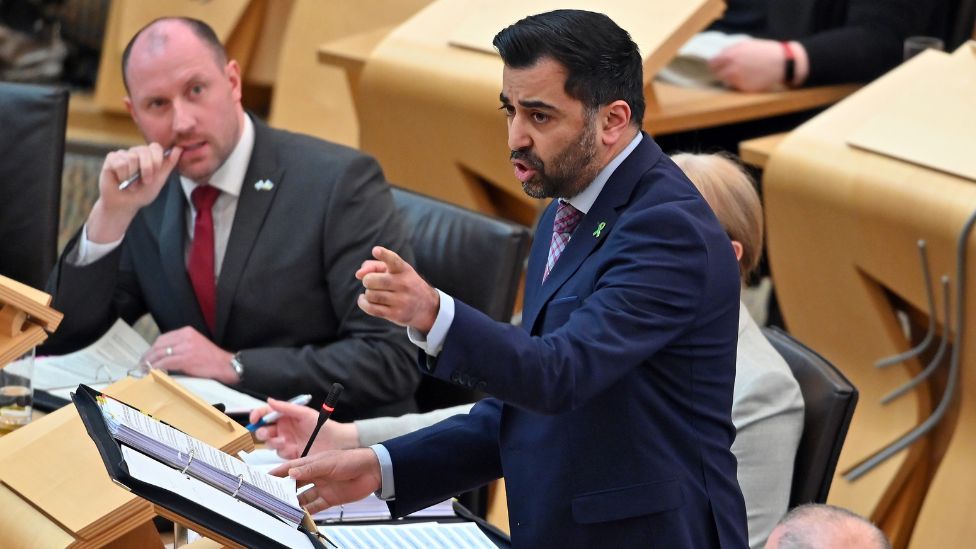Humza Yousaf: Childcare to be focus of programme for government
- Published
- comments

First Minister Humza Yousaf says childcare will be at the centre of his government's policy agenda for the coming year.
The SNP leader will reveal his new programme for government at Holyrood later as MSPs return from summer recess.
Ahead of the announcement, he said improving access to childcare was a "win-win" for families and the economy.
Mr Yousaf is also expected to propose a ban on single-use vapes.
He previously said a ban would be considered. It is now thought the Scottish government will go ahead with the plans, subject to a formal consultation.
MSPs will debate the proposals this week in parliament.
Mr Yousaf said the announcement would include funding to send children to breakfast and after school clubs and potentially further expansion of free childcare and support for staff - including those in the private, voluntary and independent sector.
Children aged three and four in Scotland currently get 1,140 hours of free care a year. The first minister has said previously he would back universal childcare for one and two-year-olds.
The SNP leader also said his government would commit to taking action to protect people living in the private rented sector.
A pilot of four-day working weeks for public sector staff, an increase in the £25 Scottish Child Payment and tax reforms are among other measures that could be announced, according to reports.
Mr Yousaf said the programme for government speech, which comes at the start of each new year at Holyrood, would be centred on childcare.
He said: "I know as a parent with a young child how important childcare is for families.
"We know particularly for families from low-income households it can be the difference to be able to get back into work, employment, training and it opens up huge opportunities so it's a win-win.
"It's a win in terms of tackling poverty but also a win for the economy as well."
Chris Birt, associate director for Scotland for the Joseph Rowntree Foundation, urged the government to introduce more targeted childcare support.
"Poverty is not to do with the weather, it is designed by the systems we put in place," he told BBC Radio's Good Morning Scotland programme. "And often the childcare system is a good example.
"We have a childcare system at the moment which the government generously contributes to - their current offer costs them over £1bn a year.
"But we suspect that that benefit is mainly going to better-off families because the offer tends to be inflexible and tends to suit more of a Monday to Friday, 9am - 5pm working pattern."
He added: "For many people on lower incomes who may be doing more unpredictable shift patterns, that just doesn't fit their lives."
Mr Birt also called for more targeted support for single and disabled people.
The first minister said other key aims of the programme for government will include reducing poverty, delivering economic growth, tackling climate crisis, and improving public services.
Humza Yousaf spent his first few months as first minister effectively clearing the decks. Despite running as the "continuity candidate" to Nicola Sturgeon, Mr Yousaf started out by shredding much of his predecessor's policy platform.
He sought to reset relations with business and local government. The National Care Service and the Deposit Return Scheme were kicked into the long grass. And Highly Protected Marine Areas and a ban on alcohol advertising were binned.
Now, we get to find out what Mr Yousaf is for - what it is that he wants his government to actually achieve.
We have had hints from his leadership campaign, which had a heavy focus on social justice issues, and his initial statements which promised "a fresh start" for the government.
But today we will see in black and white the legislation he wants to pass and the reforms he wants to deliver - and thus the debates that will shape the remaining three years of the Holyrood term.
The Scottish Fiscal Commission warned in May that the government was facing a £1bn shortfall for day-to-day spending next year.
Its report found the gap between income and spending plans could rise to £1.9bn in four years.
Ahead of the programme for government announcement, UKHospitality Scotland executive director Leon Thompson said Mr Yousaf should commit to ensuring business rates will not rise with inflation.
CBI Scotland, meanwhile, called for a new approach from the government to meet its target to cut greenhouse gas emissions to net zero by 2045.
The trade confederation called on ministers to reduce planning barriers, cut times for projects to be green lit and set up gigabit-capable digital connectivity.
The body also lobbied for a target to build 25,000 homes each year and for further investment in transport infrastructure.
'Nationalist obsession'
The Scottish Greens, who are in a power-sharing agreement with the SNP, said the proposals would focus on the climate crisis and the cost of living.
"This will be a positive and progressive programme for action that has Green values at its heart," co-leader Lorna Slater said.
Meghan Gallacher, deputy leader of the Scottish Tories, said: "Humza Yousaf must use his first programme for government to focus on Scotland's real priorities, rather than his nationalist obsession."
Scottish Labour deputy Leader Jackie Baillie called on the first minister to put the NHS and the cost of living crisis "front and centre" of his policy proposals, claiming it was "his last chance to save the remaining shreds of his reputation".
Scottish Liberal Democrat leader Alex Cole-Hamilton urged the government to set up a fund to help local authorities remove potentially dangerous concrete from public buildings, rule out council tax rises and improve care for Long Covid sufferers.
He also called for action on rail fares, sewage dumps, social care and violence in schools.
- Published6 September 2022